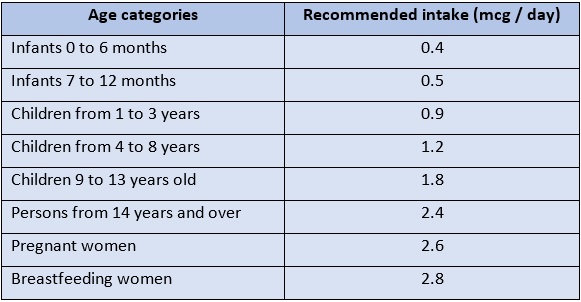Vitamin B12 is essential for good cell renewal and the production of red blood cells. It is also very important for pregnant women for the proper development of the fetus. Discover the role of vitamin B12, its recommended nutritional intakes, and its deficiency.
1. Description of Vitamin B12
Vitamin B complex, vitamin B12, or cobalamin comes in the form of a red crystalline compound giving it the name of "red vitamin." The name cobalamin refers to its cobalt content, which is unique among vitamins.Cobalamin is essential for growth, cell division, the proper functioning of all cells in the body, and the balance of the nervous system. It is involved more precisely in the synthesis of DNA and RNA, proteins, myelin, and in the formation of red blood cells, as well as in the metabolism of carbohydrates and lipids.Vitamin B12 works to build the cells and tissues of the body, and the lack of vitamin B12 leads to many diseases, especially nerve problems. Vitamin B12 is absorbed in the underpart of the small intestine; then, it is stored in the liver, and then distributed to the rest of the body.
2. Food sources of vitamin B12
Among the primary sources of vitamin B12 are the animal products, including organ meats and shellfish. It is worth noting that this vitamin may be available in some of the subsidized vegetable products, which makes it an appropriate option for vegetarians. Among the most important sources of the vitamin B12 are the following:Salmon contains 4.9 micrograms of vitamin B12Canned Tuna: 2.5 mcgBeef (three ounces): 1.5 mcgCooked beef liver 71 to 83 mcg Chicken breast (three ounces): 0.3 mcg Roasted chicken: 0.5 mcgLow-fat Greek Yogurt (six ounces): 1.3 mcgLow-fat milk (one cup): 1.2 mcgPork (three ounces): 0.6 mcgEggs (large pill): 0.6 mcgVitamin B12 is not found in plant foods, but it is found in fortified grains and green leafy vegetables
3. The recommended nutritional intakes of vitamin B12
The following table shows the daily intake of vitamin B12 according to age groups, in addition to pregnant and breastfeeding women

4. Roles of vitamin B12
- Vitamin B12 is essential for cell renewal.
- It thus contributes to the good condition of the skin. It provides freshness and softness, helps prevent acne, and fights early signs of aging from fine lines and wrinkles.
- Vitamin B12 maintains brain health; it is essential for the proper functioning of the nervous system. It prevents stroke risk and builds red blood cells that have an important role in transporting hemoglobin throughout the body.
- In combination with vitamin B9, it reduces the blood level of homocysteine, a compound whose excess is implicated in cardiovascular diseases.
- It participates in the formation of red blood cells.
- In women, during pregnancy, vitamin B12 is important for the expansion of blood volume, as well as the development of the nervous system of the fetus.
- Vitamin B12 protects against anemia.
Related: What are the foods that contain vitamin D?
5. Vitamin B12 deficiency
Vitamin B12 reserves in the body are important. Therefore, symptoms due to a deficiency can take months or even years to appear and are difficult to diagnose. Vitamin B12 deficiency causes fatigue, weakness, shortness of breath, nausea, constipation, flatulence, loss of appetite, and weight loss. It can also cause neurological symptoms: tingling and numbness in the limbs, difficulty walking, mood disorders, memory loss, and dementia.B12 deficiency is often associated with an absorption problem. B12 in food is linked to proteins from which it separates under the action of stomach acid and enzymes. Once detached from the protein, it must bind to the intrinsic factor, a substance secreted by the stomach's lining, to pass into the blood. The absorption of vitamin B12 is reduced if one of the two stages is slowed down or prevented.
6. Symptoms of vitamin B12 deficiency
There are many symptoms that appear when there is a vitamin B12 deficiency includes:Feeling very tired, short of breath even after a slight movement, heart palpitations, headache, decreased appetite, stomatitis, yellowing of the skin, feeling numb, depression, and memory problems.If these symptoms appear, you need to consult your doctor to diagnose the condition as quickly as possible. Although many symptoms improve with treatment, while other problems cannot be treated.
7. Causes of vitamin B12 deficiency
7.1 Insufficient daily intake of vitamin B12
Vitamin B12 may be under-supplied by cells if:
- Your diet is not very diverse or vegan,
- You have an increased need for vitamin B12, for example during a period of stress, or high sports activities,
- Your gastrointestinal tract has a disturbed absorption capacity.
7.2 Lack of absorption
It is the most common cause of vitamin B12 deficiency, due to a number of conditions, such as excessive growth of bacteria in the small intestine, and poor absorption resulting from malabsorption disorders such as celiac disease, or what is known as wheat allergy disease (Celiac disease) or Some disorders of the pancreas.
7.3 Lack of storage in the body
A liver disorder may interfere with the storage of vitamin B12; because it is mostly stored inside the liver.
8. Risks of excessive vitamin b12
The scientific literature does not report any side effects linked to vitamin B12 intake higher than the recommended nutritional intake (except for the injectable forms used in the treatment of certain deficiencies). There is, therefore, no safety dose limit.






